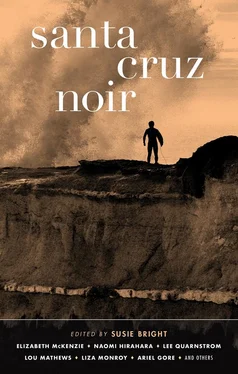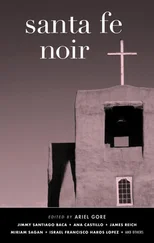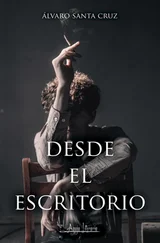Naomi Hirahara - Santa Cruz Noir
Здесь есть возможность читать онлайн «Naomi Hirahara - Santa Cruz Noir» весь текст электронной книги совершенно бесплатно (целиком полную версию без сокращений). В некоторых случаях можно слушать аудио, скачать через торрент в формате fb2 и присутствует краткое содержание. Город: New York, Год выпуска: 2018, ISBN: 2018, Издательство: Akashic Books, Жанр: Детектив, на английском языке. Описание произведения, (предисловие) а так же отзывы посетителей доступны на портале библиотеки ЛибКат.
- Название:Santa Cruz Noir
- Автор:
- Издательство:Akashic Books
- Жанр:
- Год:2018
- Город:New York
- ISBN:978-1-61775-622-1
- Рейтинг книги:5 / 5. Голосов: 1
-
Избранное:Добавить в избранное
- Отзывы:
-
Ваша оценка:
- 100
- 1
- 2
- 3
- 4
- 5
Santa Cruz Noir: краткое содержание, описание и аннотация
Предлагаем к чтению аннотацию, описание, краткое содержание или предисловие (зависит от того, что написал сам автор книги «Santa Cruz Noir»). Если вы не нашли необходимую информацию о книге — напишите в комментариях, мы постараемся отыскать её.
Santa Cruz Noir — читать онлайн бесплатно полную книгу (весь текст) целиком
Ниже представлен текст книги, разбитый по страницам. Система сохранения места последней прочитанной страницы, позволяет с удобством читать онлайн бесплатно книгу «Santa Cruz Noir», без необходимости каждый раз заново искать на чём Вы остановились. Поставьте закладку, и сможете в любой момент перейти на страницу, на которой закончили чтение.
Интервал:
Закладка:
“ Para mi, poquito ensalada de Manuel ,” I said. “ Chile relleño combinacion, menos frijoles, solo arroz .”
Leobardo didn’t write it down until I finished my recitation, and then he began his own: “One small Manny’s salad, one stuffed chile, no beans, only rice. And to drink?”
“ Una Bohemia , por favor .”
Leobardo winked. “It’s December. We just got our shipment of Noche Buena. ”
The Christmas beer, a joy, a dark beer with some sweetness but more body and a great aftertaste. The German braumeisters who came to Monterrey in the nineteenth century lived on in this great beer, available once a year. “Noche Buena,” I agreed.
Leobardo bowed and smiled again. At the cash register, Socorro cackled. As always, Leobardo ignored his wife and maintained his chivalrous flirtation. “ Esta bién, señorita . Your accent is really improving.”
As he set down the beer, I said, “Leobardo. A question, and this is professional.”
“For your work?”
“Yes. Do you know anyone who knows about cockfighting in South County?”
He sat down across from me. “You need this?”
“Yeah, it matters.”
“Then you should talk to my uncle Mike. Miguel to me, but he’ll want you to call him Mike. Did you know about my family?”
“No. Just a shot. Cockfighting’s been big in Watsonville since the sixties and I know your family has been here longer than that.”
“My family is from Michoacán, and that’s the center of cockfighting in Mexico. We’ve bred champion roosters for more than a century.”
At the cash register, Socorro spiked a sheaf of bills, rolled the tape around the spike, and punched the empty cash drawer closed. She stood with the bank bag and peered at us with some humor. “If I had a peso for every macho from Michoacán who claimed he raised the best cock in the country, I’d be a happier woman than I am today.”
Leobardo rolled his eyes and blew a kiss in Socorro’s direction, “ Besos y pesos, mi amor .” He tore off a page from his order pad, wrote furiously, and then handed it to me like a check. “That’s the address and phone number. I’ll go make the call.”
The address was in Corralitos. Back at the office, Estelle looked up the parcel. It was a good-sized ranch for the area, 180 acres off Eureka Canyon Road. Miguel Sandoval was the owner.
Estelle spotted something interesting, the parcel opposite Miguel’s, which fronted on Amesti Road. It was owned by another Sandoval, Benjamin. Corralitos Creek separated the properties.
Estelle pointed out the window, “There’s your flag boy.”
I looked out. Leobardo had stepped out the front door of Manny’s and was waving a red napkin. When he saw he had my attention, he jabbed a forefinger south. It was time to go.
The day was too nice for the freeway. I took my Karmann Ghia through the apple orchards and Victorian farmhouses, then rolled down my window as I passed the Corralitos meat market to enjoy the scent of burning applewood and smoking linguiça.
I found the address, an impressive stone gate with a bronze sign affixed, Rancho Sandoval. Uncle Mike was behind the gate, an older, sturdier version of Leobardo, on horseback, a beautiful roan that must have stood seventeen hands high. I waved, and he walked the gate open and then walked it closed behind me, a nice bit of horsemanship.
I leaned out and looked up at him, “Don Miguel, cómo estás ?”
He laughed, “Yeah, Leobardo said you would try out your Spanish. He said not to encourage you. It’s Mike. Follow me.”
He set out at a canter and then got up to speed, cutting through short grass and vetch that fronted the rows of apple trees. I followed on the concrete, which became well-graded dirt out of sight of the frontage road. It was almost three minutes to the house and outbuildings, clustered on a wide meadow, backed onto Corralitos Creek. It was as close to a hacienda as anything I’d seen on this side of the border.
Off to one side was what looked like a full-sized rodeo arena, with metal stands. In back, a parking lot. Mike went inside and came out bearing two sweating bottles of Noche Buena. He handed one over. “Let’s walk and talk. Leobardo told me two things. He said you wanted to know about cockfighting and he said you were to be trusted.”
I pointed to the arena. “Is that where they’re held? The cockfights?”
He laughed. “No, we actually do hold rodeos here, once a month at least, both vaquero and American.”
He took my elbow and guided me around an oak to a smaller path, which led to a pristine metal building with tiers of canted rows of windows, tilted to let in sunlight, but at an angle that made it impossible to see in from outside.
Inside, I understood I was in the Taj Mahal of henhouses — climate-controlled with filtered air, sunlit apartments filled with happy chickens, if the slow contented clucking was any indicator. Chickens of all colors walked and scratched and sat asleep on fresh straw, in tiers stretching to the roof.
“These are the hens,” Mike explained. “We sell some eggs at our roadside stand. About half of them are breeders, from long lines of fierce ancestors. Rockefeller couldn’t afford these eggs for breakfast.” Beyond the hens was a metal wall that had a metal door with a coded entry lock. Mike punched some numbers.
Beyond was Fort Rooster. The walls resounded with roosters in full cry, roosters pacing back and forth on their sawdust runways, roosters pecking at whole corncobs and their reflections in small mirrors. Combs engorged, metallic feathers flashing, mindless bright eyes reflecting us. These birds, with their herky-jerky movements, seemed more reptilian than avian.
I noticed metal bowls in a lot of the cages that seemed to have what looked like steak tartar, diced cubes of dark flesh. I pointed. “You feed them meat?”
“Horse meat,” Mike said, “low fat, lots of protein.”
“Chickens eat meat?”
“In the wild,” Mike said, “chickens eat anything: bugs, lizards, snakes, rats, other chickens — people too, if they find a body.”
At the end of the room was a deep pit; two young men were standing in it, holding what looked like younger roosters, one black, one red. They were thrusting the birds forward to excite them. They dropped the birds and there was a flurry of kicks, squawks, slashing beaks, kicking heels, and loose feathers flying. Until one bird, the red, turned away.
The men stepped in and gathered the frantic birds up, turned in different directions, and calmed them, stroking and soothing.
I looked at the confined space. “Is this where it all happens?”
“No, no, no,” Mike said. “This is the practice palenque . Come on, I’ll show you the real deal.” As we went through the back door, he turned back and spoke to the men. One nodded, and wrung the neck of the red bird.
We walked to a section of Corralitos Creek that was different from the small stream I knew. Here it was wider and deeper, twenty feet across at least. Mike pointed downstream and up: “Two check dams. We close the gates when we want to stop waders. Now, come round the corner.” There was a tall, dense eugenia hedge; on the other side was what looked like a boat landing. “I’m not actually going to show you the real palenque . It’s a quarter-mile walk on the other side.”
“On your brother’s land?”
Mike’s eyes gleamed with amusement. “I am going to show you how we get there.” He lifted the top of one of the pilings. Inside was a panel with four buttons. He pushed the top one. From beneath the deck, a metal rectangle emerged and kept emerging, like the ladder on a fire truck extending up the side of a building. The smoothness suggested hydraulics. The metal span crossed twenty feet of creek and locked into a slot on the other side. Mike pressed a second button, railings unfolded from the bed and swayed upright to lock into place. I was looking at a perfect bridge. The whole process had taken about a minute. Mike pressed the third button, the rails collapsed, and then the fourth. The return trip was less than thirty seconds.
Читать дальшеИнтервал:
Закладка:
Похожие книги на «Santa Cruz Noir»
Представляем Вашему вниманию похожие книги на «Santa Cruz Noir» списком для выбора. Мы отобрали схожую по названию и смыслу литературу в надежде предоставить читателям больше вариантов отыскать новые, интересные, ещё непрочитанные произведения.
Обсуждение, отзывы о книге «Santa Cruz Noir» и просто собственные мнения читателей. Оставьте ваши комментарии, напишите, что Вы думаете о произведении, его смысле или главных героях. Укажите что конкретно понравилось, а что нет, и почему Вы так считаете.











